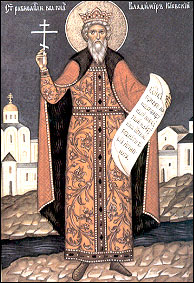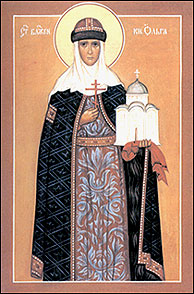 |
 |
|
 |
 |
|
|
|
Last Sunday we celebrated the Descent of the Holy Spirit and the establishment of Christ’s Church on earth, while today we celebrate the fruits of this grace-filled Church – today is the Sunday of All Saints, who provide us with an extra-ordinary example of how to live on earth correctly, in order to attain the Kingdom of Heaven. Let us look, dear brethren, at how these saints lived and how they reached paradise.
All the saints who are commemorated today followed the way of Christ, and all of them – in their own time and in their own circumstances of life – fulfilled God’s commandment of love for God and one’s brethren. And often their times were quite difficult, sometimes even more difficult than ours, and often the circumstances of their lives were spiritually more dangerous and physically worse than ours. And yet they went on, they struggled … and so they reached the Kingdom of Heaven, where they are now triumphant.
Look at the walls of the church and you will see them: martyrs, confessors, righteous men, fools for Christ, the educated, the simple, the rich, the poor, prelates, monks, laymen… Look at how many stars are shining on the Lord’s spiritual firmament. This is the heavenly Church. It is universal, and it is constantly being reinforced from the earthly Church, where all of us are members, dear brethren. There is a place for everyone there. This is what today’s reading from the Epistle teaches us: “Wherefore, seeing such a cloud of witnesses surrounding us, let us lay aside every weight and the sin that besets us, and let us run with patience the race that is set before us, looking unto Jesus, the Author of our faith.”
Just think, dear brethren: all these saints were people like ourselves. And all of them were different people, just as we are different. And their paths were different. But they all had three characteristics in common. These characteristics are defined for us in today’s Gospel. They are requisite for everyone, which means for us too, and it is impossible to bypass them. They are as follows: “Whosoever, therefore, shall confess Me before men, him will I confess also before My Father than is in heaven.” This is the first characteristic. Do you realize, dear brethren, how important it is for us, modern people? It is as though the whole world around us is asking us, pressuring us: “Are you a Christian, or are you one of us, of the world?” And we cannot leave this question without an answer. Thus with our words, our actions, our thoughts and our feelings we must reply loudly and firmly: “Yes, I am a Christian!”
And here is the second characteristic: “Whosoever loves his father or mother more than Me, is not worthy of Me.” Even now the Lord demands this absolute love from us. To love Him above everyone and above everything. And when we acquire such love for Him, only then will we be able to truly love our friends, and our neighbors, and even our enemies.
And, finally, the third characteristic: “Whosoever does not take his cross and does not follow Me, is not worthy of Me.” This is easy to understand: every person has sorrows and tribulations in his life. And they are very individual, each person having his own, and they make up each person’s own cross to bear. It is very difficult, very hard, but such is our life and such is God’s will concerning us…
Let us thank God even for this cross of ours. We cannot attain salvation without it. That is the reason the Lord gives it to us. The good Lord wants all of us to be saved, and to be joined together in one eternal triumph with all the saints whom we glorify today.
Adapted from “The One Thing Needful”
by Archbishop Andrew of Novo-Diveevo
|
 |
Homily for the Sunday of All Russian Saints
|
|
The day of commemoration of all Russian saints reveals to us the spiritual skies under which the Russian land was being formed and proceeded to exist historically.
The very existence of the Russian people is tied in with the inception of its spiritual life, with its assimilation of the foundations of a Christian outlook: it is senseless to seek on earth the meaning and purpose of life which ends in death. One must aspire to a divine, grace-filled, eternal life, and then this temporal life will also fall into place. “Seek ye first the Kingdom of God and its truth, and all this shall be added unto you.” Faith and the Orthodox Church united separate tribes into one people. The basic characteristic of the Russian people was the belief in the Kingdom of God, the search for it, the search for truth. For the sake of God’s Kingdom, for the sake of its attainment, for the sake of prayer, Russian ascetics rejected worldly vanity and went off into deep forests and uninhabited islands. They were only seeking the Kingdom of God, not to build or create anything, they were only escaping from people, but people followed them for the sake of the Kingdom of God that was to be found in those forests and on those islands, around those righteous men, and thus sprang up Russia’s famous monasteries and hermitages.
The search for truth has always been the major thread in the life of the Russian people, and it is not by chance that the first written code of law was called “Russian Truth.” Yet it was not only those who escaped from the world who aspired after heaven and the Kingdom of God, but all religious Russian people understood the meaning of life in those terms. All those who were building Russia up as a nation, though living in the world and fulfilling their responsibilities, always considered faithfulness to the Heavenly Kingdom and Divine Truth to be the major aspect of life.
|
|
In Russia there were princes, warriors, landowners – people of all ranks and professions, but their basic understanding, aspiration and purpose in life was the acquisition of the Kingdom of God, participation in it. Conversion to the Christian faith transformed also the Russian princes. Power is always the expression of consciousness and will. Power is always guided by some philosophy or other, some understanding of the meaning of life and one’s activity or other. Prior to holy Prince Vladimir the Russian princes were leaders of warring tribes and were engaged in war for the sake of the spoils and the glory. Having become Christian, they became individual leaders of one people. Conversion to Christianity brought with it a realization and feeling of unity. Truth was in the brotherhood of princes, while internecine war became falsehood. Holy Prince Vladimir gave the Russian people a new understanding of life and a new life force. Calamities, misfortunes, defeats are powerless before the main force of life, powerless before a spiritual life. The Kingdom of God, its spiritual comfort, and participation in it remain untouched. A raging storm passes, and man continues to live. Thus martyrs smiled during the cruelest tortures because of the joyous sensation of God’s grace within them.
|

Holy Prince Vladimir |
|
This is the source of Russia’s life force. The history of the rise of Moscow vividly confirms this idea. Moscow was ruled by pious princes who had acquired an Orthodox understanding of truth, and for this reason the holy hierarch Peter told the Muscovite prince that Moscow would be elevated if the prince built within it a House of the Holy Virgin. In other words, if you are faithful to Orthodoxy to the very end, and will first seek the Kingdom of God and its truth, then all of this – all earthly, temporal, national things, – shall be added unto you. Such was the design of Moscow, and for a long time it remained faithful to the testament of hierarch Peter, and the nightly roll call on the walls of the Kremlin was conducted with the words: “O Holy Theotokos, save us!”
|

St. Olga |
This does not mean that the life and the people were holy. Not at all! People are always sinful, but it is important and a saving grace to possess an understanding of good and evil, to aspire to the truth, because resurrection is then possible.
Sinful Moscow, the capital of sinful Russia, fell hard many times in its historic life, but arose anew because its awareness of truth never died. In the Time of Troubles Russia fell so low that all her enemies were sure she was fatally wounded. Russia had no tsar, no government, no military force. Moscow was ruled by foreigners. People became fainthearted and weak, and waited to be saved by foreigners. Destruction seemed inevitable, and Russia would have definitely been destroyed if all awareness of truth had been lost. But Russia was saved by the hierarch Hermogenes, who spiritually and morally revived the Russian people in faith and confession, and once again the people stepped unto the path of seeking the Kingdom of God and its truth – the truth of temporal national life being subordinate to spiritual rule. Nowhere else in history can one come across such a deep fall of a nation and such a quick resurrection of it a mere year later. Such is the history of Russia, such is its path.
|
|
After Peter the Great the life of society stepped off the Russian path. Although it did not wander off completely, nevertheless it lost the clarity of awareness of truth, the clarity of belief in the truth of the Gospel. “Seek ye first the Kingdom of God and its truth.” The cruel suffering of the Russian people is the consequence of Russia’s betrayal of itself, its path, its calling. But that cruel suffering, the desire for life even under the power of virulent enemies of God tell us that the people have not entirely lost their awareness of truth. Russia will arise just as it arose before. It will arise when the fire of faith starts burning; Russia will arise when it sees and comes to love its Orthodox saints and confessors.
Today, on the day of all Russian saints, the Church points them out to us, and the Orthodox faithful look at them with spiritual rapture, look at the multitude of them in the Heavenly Kingdom! And how many remain still unglorified, an infinite number of them! Russia will arise when it lifts up its gaze and sees that all the Russian saints are alive in the Heavenly Realm, that they are filled with the spirit of eternal life, and that we should be with them too, and should spiritually touch upon and come to participate in their eternal life. In this lies the salvation of Russia and the entire world.
Saint John of Shanghai and San Francisco
|
 |
|
|
|
|
 |